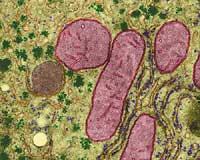Remains of mitochondria in anaerobic cells
Microsporídia are microorganisms that do not need oxygen to live. Because they don't need oxygen, they don't have mitochondria, or so far they were thought.

However, scientists at the Dundee University of Great Britain have studied microsporídia and have shown that they have small organelles that can be mitochondria. They have used a marking molecule that binds to a gene in the mitochondria genome.
After treating microsporídia with this special marker, they discover that they have mitochondrial genome. This means that at some point in evolution these microorganisms used mitochondria.
This discovery has shown that what was thought about the characteristics of microsporídia is not true. Microorganisms have evolved from aerobic to anaerobic, so they have deduced that it is a more modern group than previously thought.





